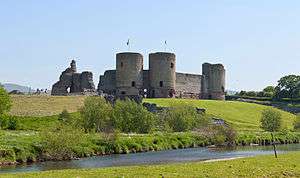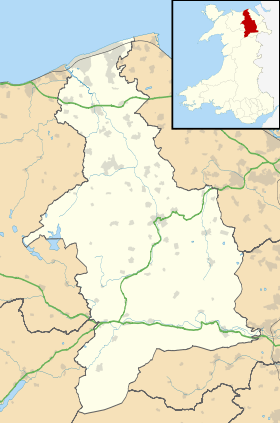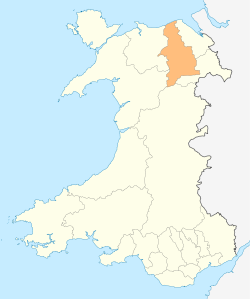Rhuddlan
| Rhuddlan | |
|---|---|
 Rhuddlan Castle in May 2012 | |
 Rhuddlan Rhuddlan shown within Denbighshire | |
| Population | 3,709 (2011) |
| OS grid reference | SJ025785 |
| Community |
|
| Principal area | |
| Ceremonial county | |
| Country | Wales |
| Sovereign state | United Kingdom |
| Post town | RHUDDLAN |
| Postcode district | LL18 |
| Dialling code | 01745 |
| Police | North Wales |
| Fire | North Wales |
| Ambulance | Welsh |
| EU Parliament | Wales |
| UK Parliament | |
| Welsh Assembly | |
Rhuddlan (Welsh pronunciation: [ˈr̥ɨðlan], approximately "RHITH-lan") is a town, community and electoral ward in the county of Denbighshire within the historic boundaries of Flintshire, on the north coast of Wales. It is situated to the south of the coastal town of Rhyl and overlooks the River Clwyd. The town gave its name to the Welsh district of Rhuddlan from 1974 to 1996. At the 2001 Census, the population was 4,296,[1] decreasing to 3,709 at the 2011 census.[2]
History

Rhuddlan has a longer history than the castle fortress built following Edward I's conquest of Wales. Prior to Norman occupation of lower Gwynedd, the Perfeddwlad, Rhuddlan was the site of a Welsh cantref and served as the seat of government and capital of Gwynedd for the Welsh king Gruffydd ap Llywelyn (1007 – August 5, 1063), whose family may have been the traditional Welsh lords of Rhuddlan for generations.
The town is known for the ruins of Rhuddlan Castle, built by King Edward I from 1277 to 1282, and for the site of another castle at Twthill, built by the Norman Robert of Rhuddlan about 1072.
The town was also the location where Edward I signed the Statute of Rhuddlan, laying down the way by which the Principality of Wales, created by the princes of Gwynedd, was to be governed.
The hymn tune "Rhuddlan" was brought to wider prominence by Ralph Vaughan Williams as music editor of the first edition of The English Hymnal in 1906, and it has since been adopted by numerous other hymnals. It is usually sung to the words of the hymns "Judge eternal, throned in splendour" and, more recently, "For the healing of the nations".
Rhuddlan railway station was part of the Vale of Clwyd Railway until it closed in the 1960s.
In 2001, the A525 bypass road was completed, easing access to Rhyl, and since then the centre of Rhuddlan has been redeveloped.
Notable people
- See Category:People from Rhuddlan
Photographer Philip Jones Griffiths, well known for his photographs during the Vietnam War, was born in Rhuddlan. Wales and Sunderland FC footballer David Vaughan was also born in the town. Lisa Scott-Lee of the pop band Steps and her brother Andy Scott-Lee lived in Rhuddlan.
References
- ↑ 2001 Census: Rhuddlan, Office for National Statistics, retrieved 30 June 2008
- ↑ "Community/Ward population 2011". Retrieved 24 May 2015.
External links
| Wikimedia Commons has media related to Rhuddlan. |
